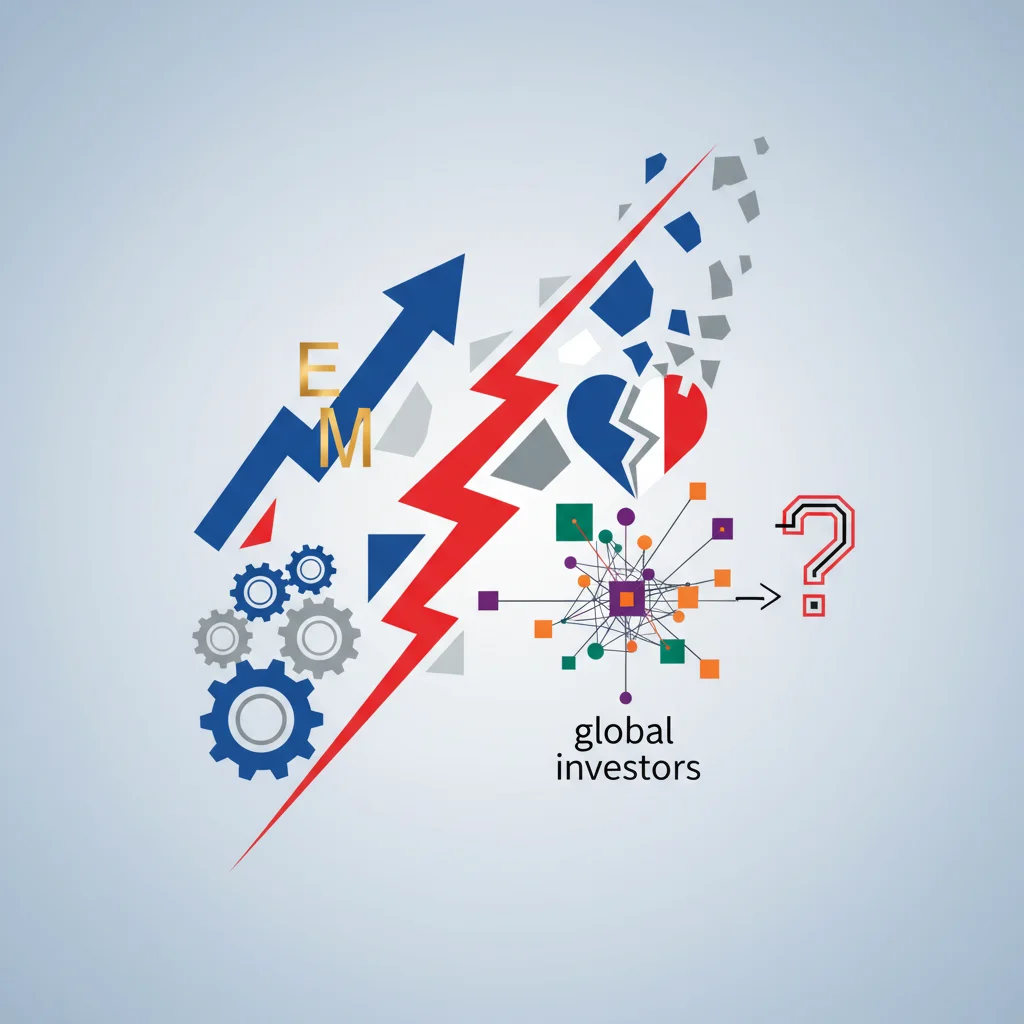
Macron’s Pivot: Why French Businesses Feel Betrayed and What It Means for Global Investors
Emmanuel Macron swept into the Élysée Palace on a wave of optimism, hailed as the pro-business reformer who would finally unshackle the French economy. His agenda was clear: cut corporate taxes, liberalize labor laws, and modernize the nation’s finances to attract global investment and spur growth. For a time, it seemed the French business community had found its champion. Today, that sentiment has soured dramatically, replaced by a growing sense of consternation and what some are calling a “betrayal.”
The recent pledge by President Macron’s government to suspend crucial pension reforms and continue a controversial tax on large corporations has sent shockwaves through the country’s boardrooms. This move, seen as a concession to populist pressures, marks a significant departure from the business-friendly platform that defined his early presidency. For investors, finance professionals, and business leaders watching from the sidelines, this pivot raises critical questions about the stability of French economic policy, the future of its stock market, and the nation’s long-term appeal as a hub for investment and innovation.
The Promise of a Pro-Business Renaissance
To understand the depth of the current disappointment, one must recall the initial euphoria surrounding Macron’s economic vision. His administration moved swiftly to implement reforms long advocated by the business community. He slashed the corporate tax rate, reformed the notoriously rigid labor code to give companies more flexibility, and positioned France as a post-Brexit haven for banking and financial technology (fintech) firms.
These policies were designed to attack the structural weaknesses that had plagued the French economy for decades, aiming to boost competitiveness and reduce unemployment. The message to the world was unequivocal: France was open for business. This agenda was music to the ears of organizations like Medef, France’s largest employers’ federation, which saw Macron as an ally in creating a more dynamic and prosperous economic environment. The initial results were promising, with foreign investment flowing in and France’s profile on the global stage rising.
A Storm on the Horizon? Decoding Jamie Dimon's Urgent Warning for the Stock Market
The Political Backlash and the Policy U-Turn
The reformist zeal, however, soon collided with political reality. The “gilets jaunes” (yellow vests) protests, which began in late 2018, exposed a deep well of public anger over the rising cost of living and a perception that Macron’s policies favored the wealthy. This widespread social unrest forced the president into a difficult position, caught between his pro-growth agenda and the demands of a restive populace.
In an attempt to quell the protests and rebuild political capital, the government began to recalibrate its approach. This recalibration has now culminated in two major policy decisions that have alienated its former business allies:
- The Continued “Tax Raid”: The government has signaled its intent to maintain a “production tax,” a levy on company revenue rather than profit. Business leaders argue this tax is particularly damaging as it penalizes companies regardless of their profitability, stifling investment and hiring. The pledge to continue what one business leader called a “tax raid on big companies” has been met with dismay, seen as a direct contradiction of the goal to make France a low-tax jurisdiction for corporations.
- The Suspension of Pension Reforms: Perhaps the most significant blow is the suspension of the ambitious pension system overhaul. This reform was considered the cornerstone of Macron’s plan to put France’s public finances on a sustainable long-term footing. By unifying dozens of separate pension schemes into a single, points-based system, the reform aimed to ensure the system’s financial viability amidst an aging population. Its suspension is viewed not just as a failure of policy but as a capitulation that jeopardizes the country’s future economic stability.
This table summarizes the stark contrast between the initial promises of the Macron agenda and the current policy landscape:
| Policy Area | Original Pro-Business Promise | Current Reality & Business Reaction |
|---|---|---|
| Corporate Taxation | Significant cuts to corporate and production taxes to boost competitiveness and attract investment. | Commitment to continue a “production tax” on large firms, which business leaders call a “betrayal” that harms investment (source). |
| Pension System | A landmark structural reform to create a sustainable, unified, points-based system. | Reform suspended indefinitely, raising serious concerns about long-term fiscal sustainability and sovereign debt. |
| Labor Market | Successfully implemented reforms to provide companies with more hiring and firing flexibility. | One of the few major reforms to remain largely intact, though overshadowed by fiscal policy reversals. |
| Overall Economic Philosophy | A clear, supply-side approach focused on making France more attractive for capital and business. | A pivot towards more populist, demand-side measures to appease social unrest, creating policy uncertainty. |
The Broader Implications for the Economy and Investors
The fallout from this policy shift extends far beyond the confines of Paris. It impacts everything from the bond markets to the boardrooms of multinational corporations considering European expansion.
1. Eroding Investor Confidence
For those involved in finance and investing, policy predictability is paramount. The government’s reversal on key reforms introduces a significant level of uncertainty. International investors who were drawn to France by the promise of a stable, pro-business environment may now reconsider their commitments. This “policy risk” can lead to higher borrowing costs for the French government and corporations, as investors demand a premium for the lack of predictability. The credibility of the French government’s long-term economic strategy is now in question, a sentiment echoed by business groups who feel their trust has been misplaced (source).
Unpacking the .6bn Deal: HSBC's Bold Move to Delist Hang Seng Bank
2. A Cloud Over the Stock Market
The French stock market, represented by the CAC 40 index, is heavily weighted with large, global companies in sectors like luxury goods, banking, and energy. While these giants are somewhat insulated by their international operations, domestic policy still matters. An environment of higher corporate taxes and stalled structural reforms can dampen earnings forecasts and weigh on stock valuations. Sectors that are more domestically focused, such as banking and utilities, may feel the impact more acutely. The suspension of pension reform, in particular, casts a long shadow over the nation’s sovereign debt profile, a key macroeconomic indicator for equity investors.
3. The Future of France as a Fintech and Innovation Hub
In recent years, France has made impressive strides in cultivating a vibrant startup ecosystem, particularly in financial technology and blockchain. Paris has emerged as a genuine competitor to London and Berlin. This success was built on the back of a supportive government agenda. However, a perception of policy instability and a less favorable tax regime could stall this momentum. The fintech sector thrives on nimble regulation and a belief in long-term growth. If the government is seen as prioritizing short-term political gains over long-term economic health, it could deter the next generation of entrepreneurs and venture capitalists from betting on France.
The ,900 Gold Prophecy: Is Goldman Sachs Predicting a New Gilded Age?
Navigating the New Normal
For business leaders and finance professionals, this new environment demands a strategic reassessment. The economics of investing in France have changed. While the country still possesses immense strengths—a highly skilled workforce, world-class infrastructure, and a central position in the European economy—the political risk has undeniably increased.
Companies will need to factor this uncertainty into their financial models and investment decisions. The dream of a straightforward, low-tax, business-friendly France has been deferred, replaced by a more complex and politically sensitive landscape. The relationship between the government and the business community, once a partnership, is now strained, requiring careful navigation and a renewed focus on political and economic analysis.
Ultimately, President Macron’s pivot serves as a powerful reminder that in any democracy, economic policy is inseparable from the political and social context. The pro-business agenda that once seemed unstoppable has been checked by public pressure, leaving a trail of broken promises and a business community feeling left out in the cold. The path forward for the French economy is now less certain, and the world of finance is watching to see if the reformer can find a way to reconcile his ambitious vision with the complex realities of governing.


